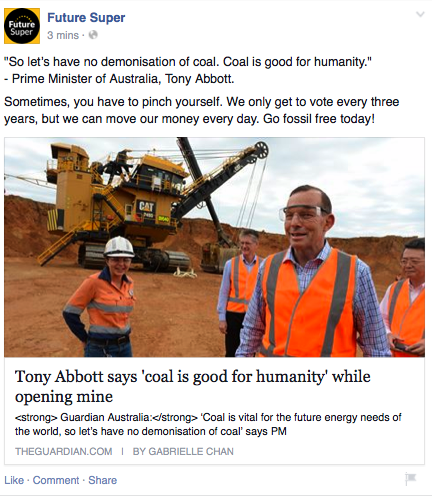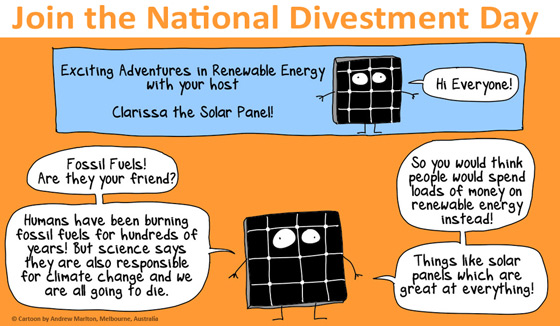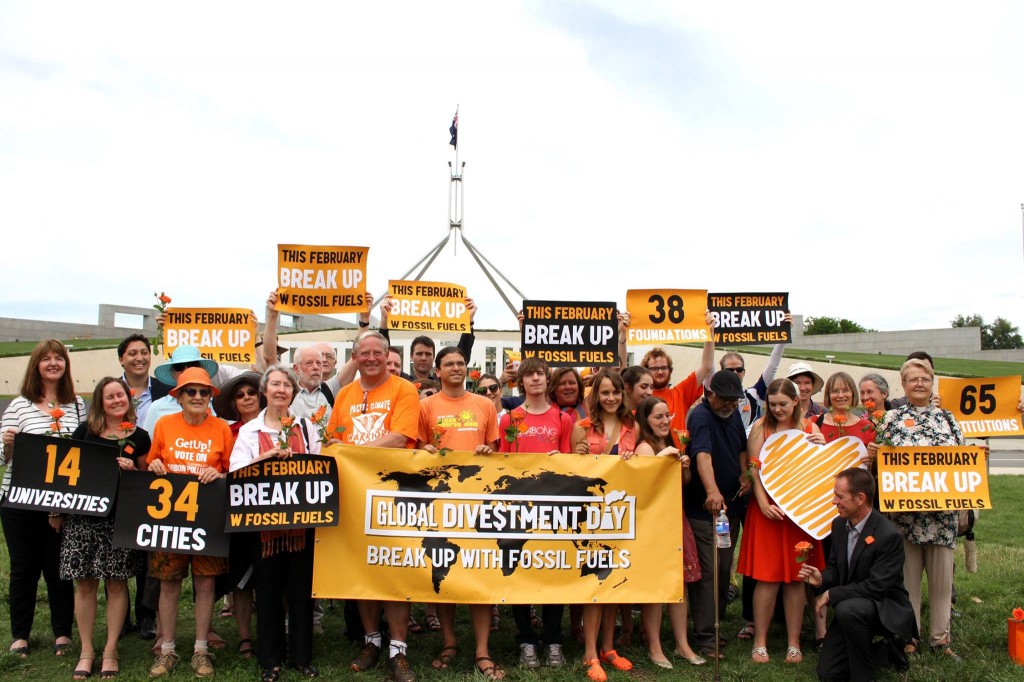
Content on this page:
1) Introduction
2) Australian Divestment Quick Guide
3) Clippings from the divestment news stream
Momentum is growing for the divestment movement, in Australia as well as globally. The powerful things about divestment is that it is something each and everyone of us can do – and it is becoming an increasingly more important way of signaling to the investors in fossil fuel projects that, really, their days are counted. We don’t need and we don’t want to see our planet destroyed by climate change.
180 institutions — with combined assets of over $50 billion — divested in 2014, citing climate or carbon risk as their motivation. To date, there are more than 500 active campaigns calling on universities, cities, churches, banks, pension funds and other institutions to halt investment in dirty energy.
Collectively these campaigns are challenging the social license of the fossil fuel industry, showing that its practices are no longer socially or morally acceptable, and offer a wake up call that energy companies can no longer burying their heads in the sand over climate change. By taking back power from these companies, citizens are also delivering a mandate to governments to support bold climate leadership.
» www.treealerts.org
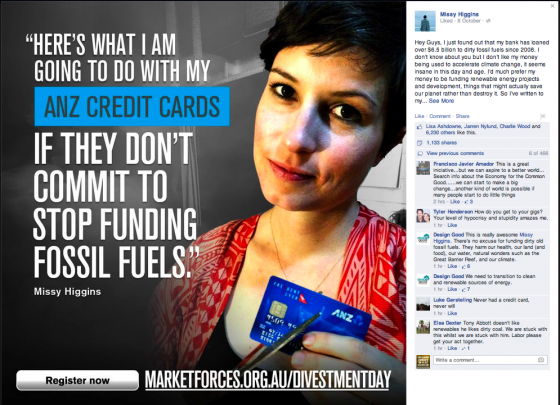
“We only get to vote every three years, but we can move our money every day. Go fossil free today!”
Introduction
First a few lines about what divestment is. And why we all have to divest now.
For some reason, many people have not yet understood how bad things really stand at the moment. We can get over that part relatively quickly. For instance, just read a few headlines such as:
» Washington Post: Effects of climate change ‘irreversible,’ U.N. panel warns in report
“The Earth is locked on an “irreversible” course of climatic disruption from the buildup of greenhouse gases in the atmosphere, and the impacts will only worsen unless nations agree to dramatic cuts in pollution, an international panel of climate scientists warned Sunday.”
» Bank Track: ‘Record year’ for bank coal financing as latest UN climate warning looms
“A report has shown that 92 of the world’s leading banks last year provided at least 66 billion euro in financing to 65 coal mining and energy companies.”
Even after the publication in 2012 of numerous reports on climate change and the clear, present and irreversible danger burning fossil fuels poses to life as we know it, bankers and investors keep shutting off from this reality and hand out 66 billion euro to fossil fuel companies in 2013 alone. They will not stop. And this trend is continuing in 2014.
This is how absurd things stand. Suicidal, really. Unintelligent short-sighted irresponsible egoism. As Peter Bakker, president of the World Business Council for Sustainable Development, said it, “Business cannot succeed in a society that fails.”
This is where the power of ‘divestment’ (dis-investment = selling stocks) comes into the picture. You can do something about this. Not alone as an individual, but as an individual in partnership with thousands of other individuals and institutions who, like you, think we need to quickly stop this madness now.
The question everyone of us must ask ourselves when we learn that 373 billion euro (US$500 billion) in total has been invested in coal mining and energy companies between 2005 and April 2014, is: Is MY money being used to fund projects in the fossil fuel industry?
If you find out that your bank is investing in destroying our planet, along with the 92 other leading commercial banks, it shouldn’t be too hard to figure out what you need to do next. It’s a pain in the ass, but you gotta do it!
We must tell our banks that they are on a suicidal path, and that they need to wake up.
» Quick tip: Australians can find out more about their bank here: www.marketforces.org.au/banks/compare and about super funds here: www.superswitch.org.au
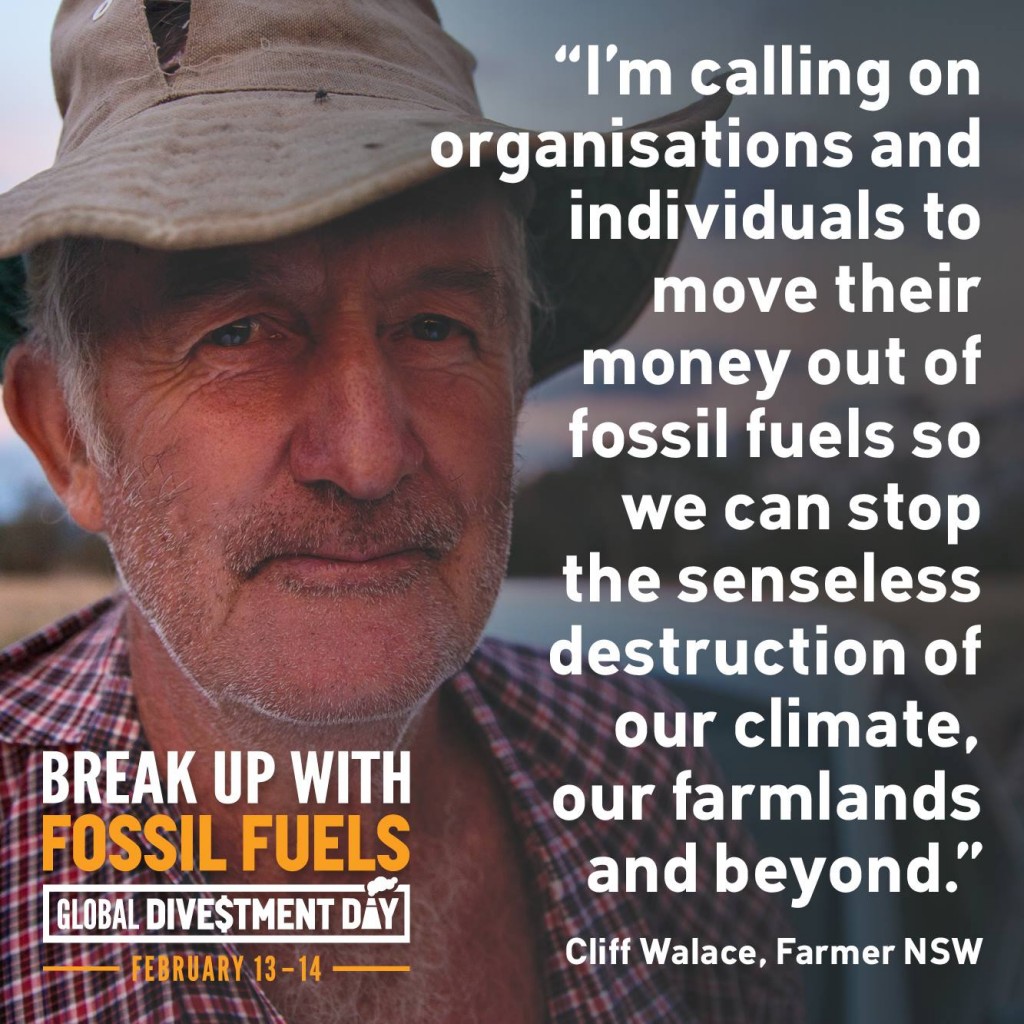
Midnight Oil’s drummer Rob Hirst has signed on to amplify the #FossilFuel #Divestment movement http://t.co/MTNvDcnXJ7 pic.twitter.com/bu6w7AOamw
— Market Forces (@market_forces) December 8, 2014
» Musicians Amplifying Fossil Fuel Divestment
www.amplifydivestment.org
Sending a signal
To ‘divest’ – to move your money from fossil fuel investments over to renewable energy investments – is all about sending signals. It is about showing leadership by example. The money transaction in itself is a statement which highlights that you have decided to take a firm stand against the continued investments in fossil fuel projects because of the global emergency with carbon emissions.
13 North American colleges and universities, 25 cities, around 40 religious institutions and several major foundations have decided to divest their endowments from fossil fuel stocks and bonds, and recently a group of independent investors announced that they are going to pull $50 billion out of fossil fuels. And the list of ‘divestors’ keep growing.
This is important, because as a method, the implications are far-reaching: The more persons, institutions and city councils that embrace the ‘leadership by example’ principle, the sooner we will be able to get the carbon emissions crisis under control. And the less will our future have to rely on the shocking failures and inaction of our national leaders and the international negotiations in the United Nations.
So, what is keeping you from taking action? Start with what you can do right here and now. Divesting your finances is both quick and efficient. Move to a bank and a super annuation / pension fund which doesn’t put your money in fossil fuel projects.
And remember that it is important to speak up about it as well. Show others that they can do the same.
Divestment explained by Bill Moyers, interviewing Ellen Dorsey and Thomas Van Dyc – two leaders in the climate change divestment campaign – about breaking the ties with the fossil fuel industry.
Ellen Dorsey is executive director of the Wallace Global Fund and a catalyst in the coalition of 17 foundations known as Divest-Invest Philanthropy. Thomas Van Dyck is Senior Vice President – Financial Advisor at RBC Wealth Management, and founder of As You Sow, a shareholder advocacy foundation.
» See a full show description and web features on: www.billmoyers.com
» ABC Radio National – 16 October 2014:
Why are people divesting from fossil fuels?
Quick Guide
How to take part in the current Australian divestment campaign
Will you join the world to break up with Fossil Fuels as part of Global Divestment Day next February 13 and 14?
RSVP today: www.350.org.au/gdd
Then LIKE and SHARE to spread the word!
There are three ways you can take a stand and Break Up With Fossil Fuels as part of Global Divestment Day:
1. Build the Buzz
Join a Global Divestment Day event near you
2. Divest yourself
• Break up with your bank
• Break up with your super fund
3. Play it forward
Start your own divestment campaign
» Read more about the event launch: www.350.org.au
» Use these tags on Twitter:
#globaldivestmentday
#breakupwithfossilfuels
#makefossilfuelshistory
Divestment Days in 2014
Two times in 2014, Australians organised national divestment days with events in locations all around Australia.
Check this video from October 2014:
When thousands of Australians publicly close their accounts in the big four banks in protest over their funding of the fossil fuel industry it is being noticed, even by mainstream media. The signal becomes even more powerful. But you don’t have to wait to participate in a National Divestment Day. Get started with the process right now.
You could start with delivering a letter of intention to your bank.
» Read more:
www.marketforces.org.au/divestmentday
» Regarding opening a new account, check this Bank Switch Guide:
www.marketforces.org.au/how-to-switch-banks-and-make-it-count
» To find a new and fossil-fuel-free bank, take a look at the banks comparison table for a list of alternative banks:
www.marketforces.org.au/banks/compare
Market Forces and 350.org have produced template letters you can fill out – or simply write your own, from the heart.
» Template letter that you can edit:
www.marketforces.org.au/wp-content/uploads/2013/10/Template-leaving-bank-letter.docx
Market Forces has some excellent resources about how to switch bank.
» See for instance:
www.marketforces.org.au/banks/map/
www.s3.amazonaws.com/s3.350.org/images/Fossil_Free_Banks_Matrix.pdf
Many banks allow you to open new accounts online these days so often you can have a new account number and BSB-number withing 48 hours if the online ID process is verified. Then new cards will come in seven or so days.
. . . . . . . . . . . . . . . . . . . . . . . . . . .
» More info about divestment:
www.gofossilfree.org.au
Super annuation and pension fund divestment
Super Switch is a new Australian online tool that will help you take action to get your superannuation out of fossil fuels: www.superswitch.org.au
» Australia has a new 100% fossil free super:
www.myfuturesuper.com.au
Clippings
from the divestment news stream
» The Guardian – 23 June 2015:
A beginner’s guide to fossil fuel divestment
A comprehensive guide to the basics of divestment: what it means, why the urgency and how it impacts climate change
» Inside Climate News – 22 December 2014:
2014: Riding a Rocket, Divestment Movement Gains Momentum
The notion that most of the fossil fuel reserves on company balance sheets must stay in the ground—stranded—is no longer unthinkable.
» Vancouver Observer – 9 December 2014:
Canadian foundation to divest fossil fuels from its investment portfolio
At a recent meeting, the Catherine Donnelly Foundation Board unanimously agreed that it would no longer make direct investments in any of the 200 global, publicly-traded companies with the largest coal, oil and gas reserves as listed in the Carbon Tracker Initiative’s “Unburnable Carbon” report. The board determined that a “business as usual” approach is not sustainable.
» WWF – 19 November 2014:
Major Norwegian fund divests from coal, invests more in renewables
Norway’s leading firm, KLP, announced they will be divesting from coal and investing more in renewable energy. Why? Climate change
Fossil fuel investing a risk to pension funds, says UK Energy secretary
Fossil fuel investing a risk to pension funds, says UK Energy secretary Ed Davey. He says action to tackle climate change could make fossil fuel companies the “sub-prime assets of the future”. The energy secretary said he wanted financial regulators to focus “on the risk that may well be under-assessed and undervalued in terms of investment in fossil fuels”.
» Read more: www.telegraph.co.uk
City of Moreland an Australian climate leader in decision to divest
The City of Moreland has become the first council in Victoria to rule out direct investments in fossil fuels and the first council in Australia to start developing a strategy to move investments away from financial institutions that fund fossil fuel developments. Moreland joins around 30 cities internationally which have made similar commitments, including Seattle, Dunedin, and Oxford.
» Read more: www.climateactionmoreland.org
A Scandinavian perspective: Per Bolund, Sweden’s Minister of Financial Markets, speaks about investment in fossil fuels, risks and responsibility at ‘The Climate Impact of Capital’.
What is obvious to a Swedish minister is unfortunately not all that obvious to any of the federal ministers in Australia.
“In the next ten years, seven trillion dollars will be spend on expanding coal. There is going to be a huge expansion of fossil fuel financing,” says Mark Campanale in this video presentation.
According to the International Energy Agency, 23 trillion dollars will be spent on more coal, oil and gas in the next 35 years.
This is a good 21-minute presention. It will give you insight into why we all need to start divesting, quickly. In particular it is interesting what Mark Campanale is telling us at 15:50–16:52.
He explains about the ‘Carbon Bubble’ from the investor’s point of view: is the “unburnable carbon” a financial bubble?
Mark Campanale is founder and executive director of Carbon Tracker. He spoke at ‘The Climate Impact of Capital’, a conference held in Stockholm on 24 November 2014 – at the time when oil prices where around 80 dollars a barrel.
Sydney University creates waves with investment ban on coal
Considering its options: Sydney Uni may divest itself of its $900,000 holding in Whitehaven. The University of Sydney has become the first institution of its type in Australia to halt further investments in coalmining.
» Read more: www.smh.com.au
The Anglican Diocese of Perth voted to divest from fossil fuels
Speaking about the decision, Reverand Evan Pederick said: “In an ecological age, the ethic of reciprocity extends to the Earth and all its living creatures, and it certainly extends to the poorest of the world’s poor, and to our children and our children’s children. We must love what God loves.”
» Read more at: 350.org.au
Glasgow University to divest £18m from fossil fuels
“Glasgow University has become the first academic institution in Europe to divest from the fossil fuel industry, in a turning point for the British arm of the student-led global divestment movement.
After 12 months of campaigning, led by the Glasgow University Climate Action Society and involving over 1,300 students, the university court on Wednesday voted to begin divesting £18m from the fossil fuel industry and freeze new investments across its entire endowment of £128m.
Describing the result as “a dramatic beachhead for the divestment movement”, American environmentalist Bill McKibben said that it sent a powerful signal that Europe would be “just as powerful in this fight as Australia and North America”.
The founder of climate campaign group 350.org added: “That it comes from Glasgow, which has as much claim to birthing the industrial revolution as any city on Earth, makes it that much more special. Everyone from the Rockefellers on down is realising it’s time to move on.”
» The Guardian – 9 October 2014:
Glasgow becomes first university in Europe to divest from fossil fuels
University court votes to divest £18m from fossil fuel industry in what campaigners call ‘dramatic beachhead’
“There are increasing signs of a seismic shift in the response by business and finance to the threat of runaway climate change.”
Jo Confino in The Guardian on 25 September 2014
The global divestment movement is gaining momentum
“If China’s moves to scale back coal use were not enough to cast an increasingly dark shadow over the coal industry’s future, the rapid growth in divestment ought to be sending shivers down its spine. Local Government Super (LGS) – one of Australia’s largest public sector pension funds with $8 billion in managed assets – has announced its intent to expunge coal investments from its portfolio, saying the “unarguable scientific reality” creates “very real investment risk”. The move by LGS illustrates the growing momentum of the divestment movement, both internationally – with the Rockefeller Foundation – and in Australia, with the Australian National University, the HESTA health industry super fund, churches in Australia and New Zealand abandoning dirty, destructive investments.”
The Tree
Pulling $50 billion out of fossil fuels
Incredible Hulk and a former Goldman Sachs guy are among the many pulling $50 billion out of fossil fuels. Together the members of Divest-Invest Individual, a coalition of individual investors, has committed to divesting more than $50 billion from fossil fuels and invest in a clean energy future.
The UN-supported Principles for Responsible Investment represents more than $45 trillion in assets under management. The Principles for Responsible Investment has ambitions for investors with a combined portfolio of $1 trillion to sign up ahead of the key global climate talks in Paris in December 2015, although this is still tiny when compared with the estimated total of more than $75 trillion in investable assets.
A group of investors have announced the creation of the Montreal Carbon Pledge. Initial signatories, which include US-based Calvert Investments and Calpers, Nordea of Sweden and the UK’s Joseph Rowntree Charitable Trust, have $850 billion under management.
» Read more: www.yesmagazine.org
“We need divestment, and reinvestment
“The main power of divestment is not that it financially harms Shell and Chevron in the short term but that it erodes the social license of fossil fuel companies and builds pressure on politicians to introduce across-the-board emission reductions.”
Naomi Klein
Critics of the carbon divestment movement often claim that divestment will have minimal impact on polluters’ bottom lines. But the American author Naomi Klein argues that this line of reasoning misses the point, quoting Canadian divestment activist Cameron Fenton’s argument that “No one is thinking we’re going to bankrupt fossil fuel companies. But what we can do is bankrupt their reputations and take away their political power.”
More importantly, divestment opens the door for reinvestment. A few million dollars out of the hands of ExxonMobil or BP frees up money that can now be spent developing green infrastructure or empowering communities to localize their economies. And some colleges, charities, pension funds and municipalities have already got the message: Klein reports that 13 US colleges and universities, 25 North American cities, around 40 religious institutions and several major foundations have all made commitments to divest their endowments from fossil fuel stocks and bonds.
» Read more: www.billmoyers.com
» How to organise a divestment campaign:
www.gofossilfree.org/uk/divestment-guide

